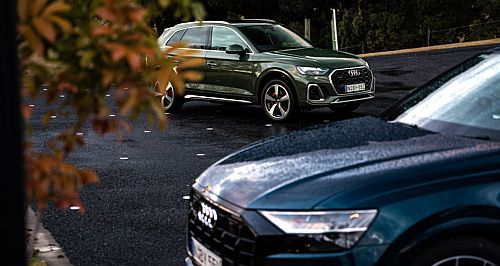News - AudiPerformance PHEV focus for Audi AustraliaAudi Australia electrification plan targets S-car performance with PHEV efficiency4 Aug 2023 WHILE battery electric vehicles (BEV) continue to storm the Australian market, with sales up 344 per cent year-on-year, Audi is on a mission to give the humble plug-in hybrid (PHEV) a healthy dollop of Ingolstadt sex appeal.
Audi first announced it would set its sight on high-performance hybrids back in 2017, but after the short-lived A3 and Q7 E-Tron models were axed, the four-ringed marque went quiet on the PHEV front.
The recently launched Q5 55 TFSI e and upcoming Q8 PHEV models spell the return of hybrid power for Audi, both highly-specified and reassuringly potent.
Aimed at buyers who want petrol performance with eco-friendly credentials, Audi says its newfound commitment to PHEVs is less about bridging the battery-electric gap and more about offering customers the “best of both worlds”.
Incoming Audi PHEV models are focused on offering performance on par with S models while co-existing with the brand’s petrol, diesel and BEV line-up.
“The PHEVs were always meant to complement what was already there, offering our customers choice,” Audi Australia product manager Matthew Dale told GoAuto.
“So PHEV is not, for us, a natural stepping stone to BEV – it was always meant to offer the best of both worlds but we really wanted to focus on performance because of our customer base at that level.
“Really it’s just having a product offering in the market that strengthens the breadth of our model range.”
According to Audi Australia director Jeff Mannering, this hybrid offering is not aimed at converting petrol or diesel buyers into an electrified vehicle, instead targeting a different buyer entirely.
“A lot of people have an electric car and, you know, the SUV in the garage. It's a segment of the market that I think is important because they want to have their fun and they want to be sustainable,” he said.
“That’s why we went for the sports ICE model, rather than the entry level, because Audi RS and S is one of our strengths.
“From a sustainability point of view people can, if they’re driving about 40 kilometres to and from work, actually drive emissions free.”
On the all-electric front, Audi sold 199 E-Tron models in GT ($180,200 before on-road costs) and RS GT ($248,200 + ORC) trim in the first half of this year, after launching in the first quarter – nearly two years after the model line’s global launch.
Audi Australia predicted annual sales potential of 400-500 vehicles for the E-Tron GT upon arrival, which this year it is on track to achieve, aiming to well and truly outdo its first stab at the BEV market with the E-Tron SUV.
“The shift in the volume of EVs in the market, if we had been sitting here two years ago you probably would never have predicted that this year was going to be at the volume that it is,” Audi Australia director Mannering said.
With the facelifted and renamed Q8 E-Tron model coming, in both wagon and Sportback trim – among other electric potentials not yet confirmed for Australia like the A5 (spied), A6, Q4 and Q6 – Audi is taking electrification seriously across its lineup of body styles.
The German brand’s PHEV offering, however, is unlikely to grow at the rate of its BEV range, with Mr Dale hinting that SUVs are better suited to hybrid powertrains.
“We’re evaluating across all segments, but the reason we brought out Q5 is it is one of our core segments,” Mr Dale said.
“The general feedback from customers and dealers was that there are a lot of questions around popular segments like that.
“I won't name the big volume one, but full battery electrics in that segment are growing strength and strength.
“When customers come into dealers, they’re always asking, you know, ‘what electrified cars do you have?’”
When Volkswagen Group Australia and Audi Australia merged back in 2021, the luxury brand was cited as the technological spearhead and, based on its growing range of BEV and now PHEV vehicles, it appears to have maintained that position.
“What we look at is that we’re in the premium segment and the rest are more mass market,” Mr Mannering said.
“We are in different segments, probably different positions in the markets, different options in the cars, different - not so much driving dynamics - but it is driving dynamics a little bit too.
“It's really important because when you buy an Audi, you're buying an Audi. When you buy a VW, you're buying a VW.”
When asked about whether we could expect to see another range-wide price increase, of which the brand imposed three since 2021, Audi Australia did not confirm another hike but did reveal plans to make its full suite of safety technology standard across every model.
"Over the next couple of months you will see a full suite across the Audi range of safety assist technologies, and that's been a big push from us,” Mr Dale said.
“That's adding extremely good customer value across the range from A1 right through to A8.”
When GoAuto probed further about whether the inclusion of safety technology as standard could increase model pricing, Mr Dale was quick to say “not necessarily” but did not confirm prices would remain static.  Read more |
Click to shareAudi articlesResearch Audi Motor industry news |

















Facebook Twitter Instagram